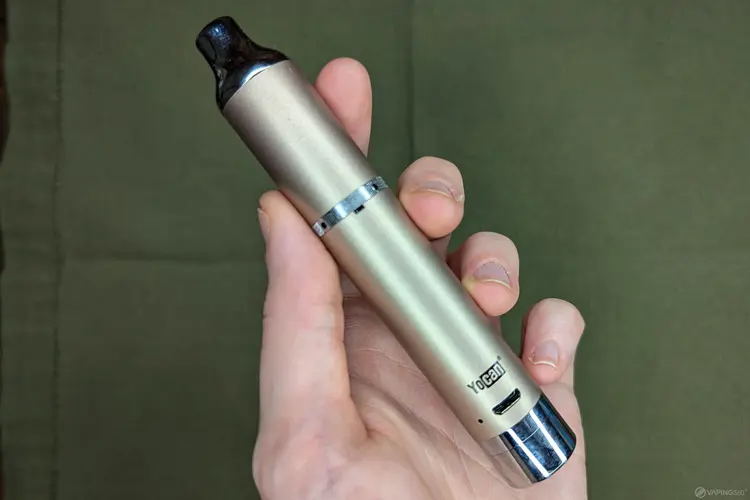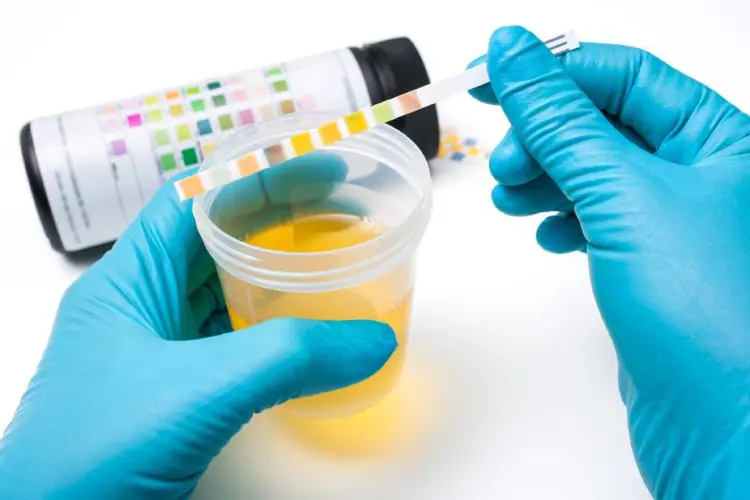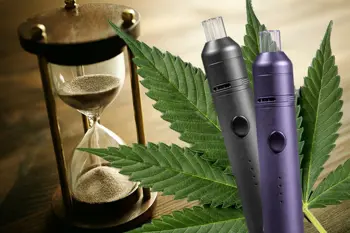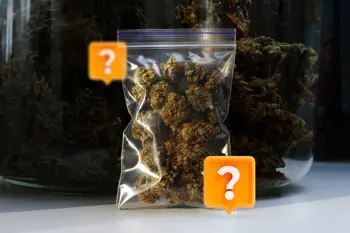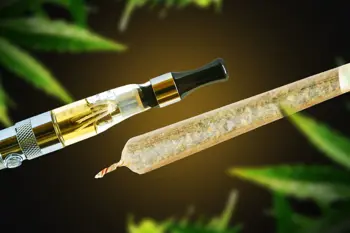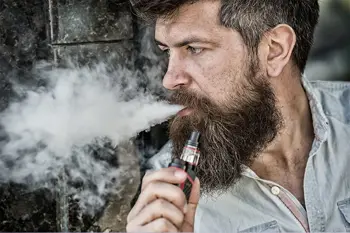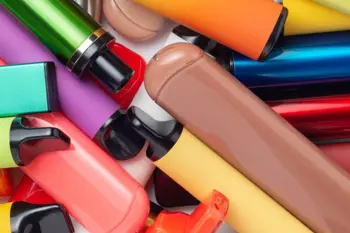- Some states have legalized recreational weed but haven’t passed laws restricting employer testing.
- Variables like frequency of use, metabolism, body mass, age, overall health or medical conditions, and even genetics can affect how long THC stays in your system.
- After vaping wax, THC metabolites can linger in your system for three days to three months, depending on use frequency and testing method.
- Saliva tests mainly detect THC consumed over the past few days, while urine, blood, and especially hair tests are effective for longer.
If you’re looking to pass a cannabinoid screening, semi-solid concentrates like wax or shatter seem like they should be the ultimate no-go. These substances possess extremely high tetrahydrocannabinol (THC) levels, typically between 50-90%. This is leagues beyond the 15-30% found in commercial marijuana bud.
On one hand, it’s true that you should steer clear of dab pens whenever you have an upcoming blood, saliva, or urine test. The same goes for weed vaporizers. But sticking to THC vape carts won’t make it much easier to flush out your system on short notice. The truth is that one form of cannabis use isn’t any less likely to trigger a positive drug test result than another.
Inhaling any form of THC will leave lasting traces in your system. Exactly how long it stays in the body can be difficult to pinpoint. Everyone’s physiology is unique and variables like metabolism, body mass, age, and medical history can all impact how long THC remains detectable.
Do employers still test for THC?
As of May 2023, a total of 23 U.S. states, plus the District of Columbia, have passed laws legalizing marijuana for recreational use. Medical marijuana is even more widespread, with varying degrees of legalization in 27 states. Despite how far we’ve come, marijuana remains illegal on a federal level, classified as a Schedule I drug by the Controlled Substances Act.
While American attitudes toward cannabis are changing alongside legal reforms, many employers continue ordering THC tests.
Remember, residing in a legal state doesn’t guarantee you’re off the hook from testing. Certain recreational states have yet to pass laws restricting employer testing or protecting the legal use of marijuana by employees. This includes Oregon, Colorado, Massachusetts, and California.
Other jurisdictions (such as New York City, Nevada, and Montana) have strict regulations around pre-employment testing. This doesn’t necessarily mean that employers are prevented from disciplining or terminating employees for cannabis use. In Connecticut and many other states, employers are still allowed to fire employees for off-duty marijuana use, assuming they establish this in a written policy.
Variables linked to how long THC lasts in the body
There’s no set length of time for THC to last in your system. Several variables related to biology, cannabis product use, and personal health can impact the length of time it’s detectable in your body:
- Frequency of use and consumption habits: Individuals who use THC pens or vaporizers on a regular basis will need longer to detox. Infrequent users, or those who consume marijuana less than three times per week, may be able to clear their systems in just two weeks.
- Metabolism: Your metabolism does more than process food and nutrients; it also determines how quickly substances like THC are broken down and dispelled by the body. Those with a higher metabolic rate may be able to rid themselves of THC faster than those with a low base metabolism.
- Body mass (BMI): THC breaks down into metabolites like THC-COOH, which are stored in cells throughout the body (including hair and nail cells)—but they’re most concentrated in fat cells. The more metabolites you’ve built up in these cells, the longer THC use will be detectable via screenings, which actually test for metabolites, not just THC itself.
- Age: The impact of age on THC filtering is closely related to metabolism. As we grow older, our metabolisms slow down. Older adults should allot extra time to clear their bodies before a test.
- Medical diagnoses: Certain medical conditions can cause THC to linger in the body. This is especially true in the case of liver or kidney diseases. When these major organs are impaired, it will take longer for them to filter out THC or its metabolites.
- Overall health and stress: Again, this goes hand in hand with metabolism. Even the common cold can cause our metabolisms to slow. Physical or emotional stress can compromise our health and make it difficult to process THC efficiently.
- Other medications or drugs: Our bodies can only metabolize so many substances at the same time. By using other drugs or medications, you’re slowing down your body’s ability to process marijuana.
- Genetics: Finally, our genetics play a role in the body’s ability to metabolize drugs and clear out THC. Those with fewer drug-metabolizing enzymes will experience a longer drug-detection window.
And to throw another wrench into this matter, some tests are more sensitive than others. Maybe your saliva sample is free of detectable THC or metabolites. A hair test taken simultaneously on the same person could still come back positive for the compound, which remains in hair much longer than in saliva or blood.
How long does a wax pen stay in your system?
There are currently four ways to screen for THC or its metabolites: urine, saliva, blood, and hair tests. The threshold set for “positive” results differs depending on the lab or testing method used.
A drug’s half-life is how long it takes, based on plasma concentration, for half of the active substance to be metabolized. THC’s half-life varies widely depending on whether you’re a frequent or infrequent user. In regular users, the compound has a half-life between 5-13 days. This is reduced significantly in less frequent marijuana users, at as little as 1.3 days.
Note that doubling a substance’s half-life won’t give an accurate estimate of when it will be fully eliminated by the body. It will take closer to 5.5 half-lives to filter out a drug completely.
Although wax atomizers provide a more concentrated hit of THC, they won’t necessarily expand your drug-detection window. Consider overall dosing and frequency of use before the method of consumption. That’s why the detection windows are largely the same, whether you’re dabbing, vaping, smoking, or using edibles.
The following estimates apply to both concentrate consumption and weed vape usage.
| Frequency of use | Urine | Saliva | Blood | Hair |
| Single use | 3-7 days | 1.5 days | 1.5 days | Max. 3 months |
| 2-3 times per week | 10-14 days | 2-3 days | 2 days | Max. 3 months |
| Daily use | 1 month | 3 days | 1 month | Max. 3 months |
| Chronic use | 2-3 months | 1 month | 1 month | Max. 3 months |
Urine tests
Because they’re easy to perform and provide generally reliable results, urine tests for THC are extremely common. To test positive for THC with a urine test, your sample will likely contain over 50 nanograms per milliliter (ng/mL) of the compound or its metabolites. If you have trace amounts in your sample, but they fall beneath this threshold, your result will be negative.
To prevent other substances from triggering a false positive, labs or employers might request a second sample. This is known as a confirmation test.
Vaping or smoking marijuana once, without regular use, will leave traces in your system for three days to a week. This window expands when we look at casual marijuana users — those who vape once or twice a week. Expect traces of THC to last in your system for 10-14 days, on average. Frequent or daily users will need to wait at least a month for THC to become undetectable.
Chronic, long-term use can push this timeframe even further. In extreme cases, it could take as long as 2-3 months to reset your system.
Saliva tests
Oral swab tests are a quick, simple method of detecting recent marijuana use—within the past few days, especially the last 24 hours. Traces of THC don’t last as long in saliva.
One-time vaping or dabbing can be detected for a maximum of 1.5 days, or two days for individuals who use marijuana twice a week or less. When performed on frequent cannabis users, saliva tests can detect THC for three days after consumption. Chronic use can linger in saliva for up to a month.
In 2021, THC saliva tests became more convenient with the creation of a breathalyzer-like device. This method reflects ingestion within the past 12 hours, and reaches peak accuracy before the 6-hour mark.
Blood tests
Like saliva tests, a blood test confirms THC use within a few days.
The sensitivity of a THC blood test is similar in one-time users and people who use three times a week or fewer. Expect a positive result if you’ve dabbed, vaped, or picked up a bong within the past 1.5 to 2 days. Blood tests can identify use in a daily or chronic marijuana user for about a month.
Hair tests
Hair follicle tests are both the most sensitive and the least common. They’re unusual because many labs aren’t set up to do them, and they’re more expensive for employers.
Longer hair samples provide more accurate results, but it’s possible to uncover any marijuana use from the past three months, including single use. Still, a positive result is more likely to occur in regular or chronic users.
These tests are so accurate because THC and other cannabinoids are stored in cells throughout the body, including hair follicle cells.
Frequently asked questions (FAQs)
Does delta 8 THC show up on drug tests?
Delta 8 THC is the legally gray cousin of delta 9 THC (“THC”). Trace amounts of delta 8 can be found in cannabis, although most products use an artificial, hemp-derived form. But delta 8 THC is THC, and is believed to break down the same way in the body. The same advice applies to delta 10 THC, HHC THCP, and other hemp-derived cannabinoids.
While the high is milder, switching to delta 8 carts before your test won’t ensure a pass. Delta 8 still shows up in screenings. Black market products are an even worse bet since you don’t know what’s in them.
Do drug tests screen for CBD?
CBD is a nonintoxicating cannabinoid known for its anti-inflammatory properties. It’s also used for mental and physical relaxation. Unlike delta 8 or delta 9 THC, CBD doesn’t cause you to become high.
Commercial tests don’t screen for CBD. However, some CBD products will contain trace or small amounts of THC. This could be discovered on a drug test if you consumed enough over time. To minimize the risk, stick to full spectrum CBD or CBD isolate.
Do dab pens stay in your system longer than flower?
They might, but it depends. The total amount of THC in your system is what matters, not the method of consumption. Dab pens and waxes do have a higher THC concentration than dry herb.
Can a drug test determine method of consumption (THC carts, dabs, etc.)?
No. Cannabinoid screenings only test for the presence of THC and its metabolites, not how the substance ended up in your body. Labs won’t be able to tell whether you vaped, dabbed, or took edibles.
How do I remove THC from my system faster?
Searching for ways to boost your body’s natural THC metabolization will garner a common result: expensive “detox” kits. There’s little evidence proving the effectiveness of these kits. You’re better off going sober for a few weeks.
Although anecdotal, some people claim that vigorous exercise helps clear out THC quickly. While we lack direct research to back up this strategy, it does have a scientific basis. Exercise leads to improved metabolic health, as well as superior kidney and liver function.
There’s a catch, though. You’ll need to exercise regularly for these results to be significant. A few intense workouts probably won’t make a difference in your body’s ability to metabolize THC.
It’s a sad truth, but there’s only one way to clear THC out of your system: not using it. This is the most effective way to prevent a failed drug screening. After your test, you can return to business as usual.
